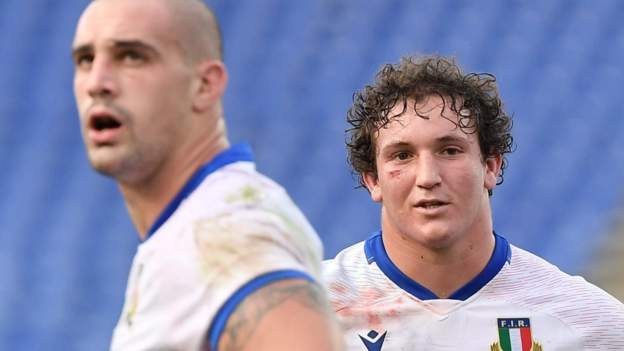
The clock is red. The France fly-half slings a long pass wide, desperately searching for a way through the defence. The wing takes it at pace. He's tackled five metres short. Italy swarm across, dragging him into touch. The whistle blows. Twenty-three Italy players leap skywards in celebration. Fifty-seven thousand in the Stadio Olimpico roar to the rafters.
This year, such scenes feel like a dream.
On Saturday, in front of an empty Stadio Olimpico in Rome, there was none of that shock and sound. France ran in three tries in the first half-hour. By 60 minutes they were 42 points clear. The win - ultimately a 50-10 drubbing - was never in doubt.
But that alternate reality has played out.
Eight years ago, Italy beat France in Rome. Just as they had two years before. Andrea Masi played that day. His 95 Tests also included wins over Ireland, Scotland, Japan and Argentina.
So what's changed?
"It is a difficult question and I ask it to myself all the time," the 39-year-old told BBC Sport.
"When I think back eight, 10 years ago when we had a lot of success with Italy, we had a really strong group of leaders. We had a core of players who had experience playing abroad, who had 90 caps or more and knew how to manage difficult situations.
"This Italy team is a very young team with good potential, but it is very inexperienced.
"[Head coach] Franco Smith has introduced all those players at a high level which shows a lot of courage, but they are struggling massively.
"The transition from a really experienced team to a really young one has been too brutal."
The generation gap has been filled with a drawer full of wooden spoons. Italy have finished bottom of the past five Six Nations championships.
Their last win in the tournament was against Scotland in February 2015. Since then they have lost 28 straight Six Nations matches, scoring 374 points and conceding 1,113.
That streak now weighs heavy on a raft of young prospects.
Stephen Varney and Paolo Garbisi, 19 and 20 respectively, are an exciting half-back partnership. Back row Michele Lamaro, 22, could be a totem. Jake Polledri, 25, and Matteo Minozzi, 24, will add quality when they eventually return to the squad.
Martin Castrogiovanni remembers making his debut at a similarly young age in similarly tough circumstances.
At 20 years old, the prop came off the bench in a 64-10 defeat by the All Blacks in Hamilton in 2002. Another debutant that day - Sergio Parisse - was just 18.
"When me, Parisse, Gonzalo Canale and the Bergamascos started our international careers together we didn't win too many games," he told BBC Sport.
"It was the start of an era, a generational change.
"But if you start something you have to finish it. That is what [then coach] John Kirwan did with us. He made Sergio the youngest number eight in international rugby and look what happened."
But, while the current crop develop, the calls for a change - specifically the introduction of relegation - grow.
"Enough's enough," said Sam Warburton last weekend. "It's beyond a joke," said fellow BBC pundit Ugo Monye.
Castrogiovanni is unconvinced by the sudden momentum behind the idea.
"If there was a big team down there they wouldn't be so sure," he said, adding that any change in the tournament's rules would only come when the stakeholders - which include Italy - renew their terms in a few years.
But both he and Masi, believe relegation, or at least the possibility and a play-off, could actually benefit Italy and the tournament overall.
"So far we have always proved we are better than the best of the tier below the Six Nations, beating Georgia, Romania," said Masi.
"We have shown we can dominate those teams quite comfortably - it would release a lot of pressure from the Italy team.
"It would help the sport's image in Italy also. The faith in this team is becoming less and less. A couple of really good wins would definitely change perceptions."
Changing the reality is not so easy.
Masi will head back to Italy this summer to take up a post with club side Benetton, having spent four years coaching Wasps' academy players.
He will link up with Marco Bortolami and Fabio Ongaro, who he played alongside in Italy's strongest era.
And overseeing it all with be Paul Gustard, the former England and Saracens defence coach, who left Harlequins in January.
"Paul will make such a big impact, both in the development of players and coaches" Masi added. "I have been so impressed by his vision and energy, his understanding, his experience."
But all of them will be working to beat heavy odds.
Italy's age-grade teams have chalked up some big upsets. In January 2020, their Under-20 team beat their Wales counterparts in Colwyn Bay.
Rival talent pools can often leave them out their depth though.
It is something Masi knows only too well from working in a Wasps academy that has spat out gems like Jack Willis and Alfie Barbeary in the past few seasons.
"In England, at under-18 level, you might have 100 really quality players. In Italy you might have five," he reflects.
And, right now, that disparity is translating too directly to the Six Nations scoreboard.















 Phone: (800) 737. 6040
Phone: (800) 737. 6040 Fax: (800) 825 5558
Fax: (800) 825 5558 Website:
Website:  Email:
Email: 






